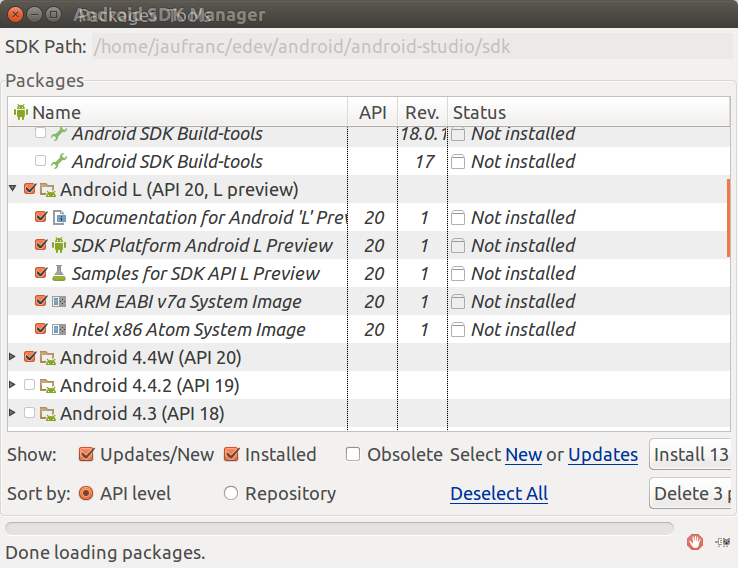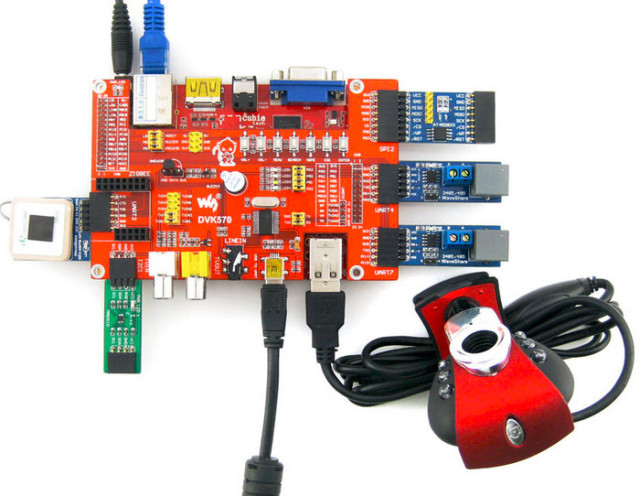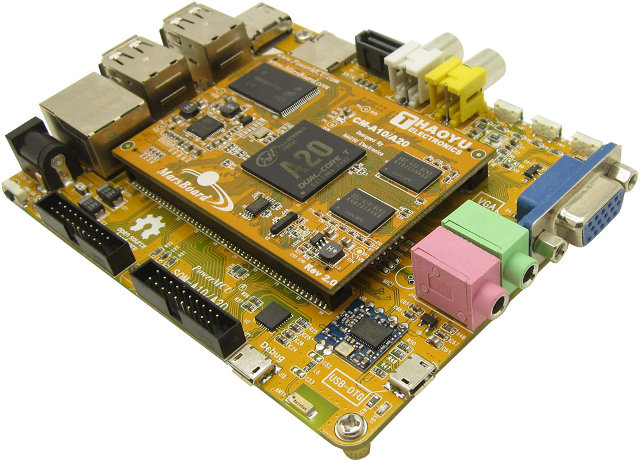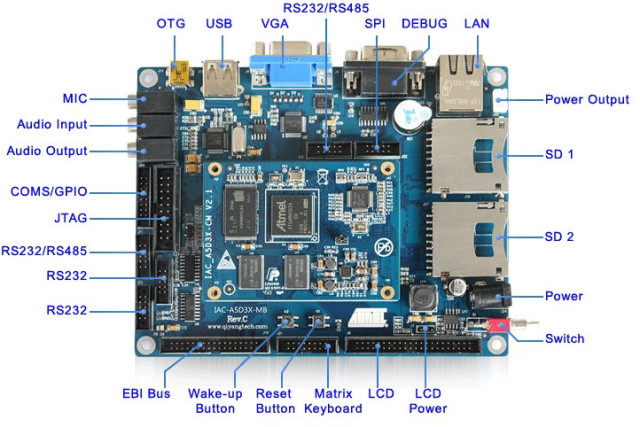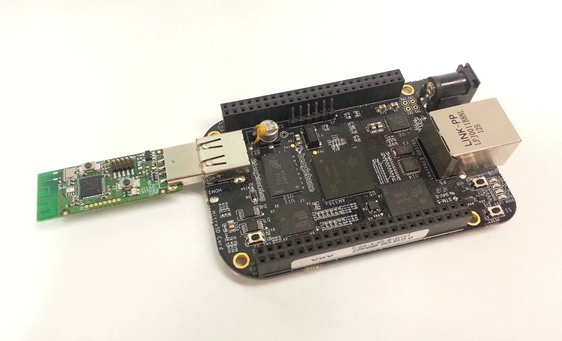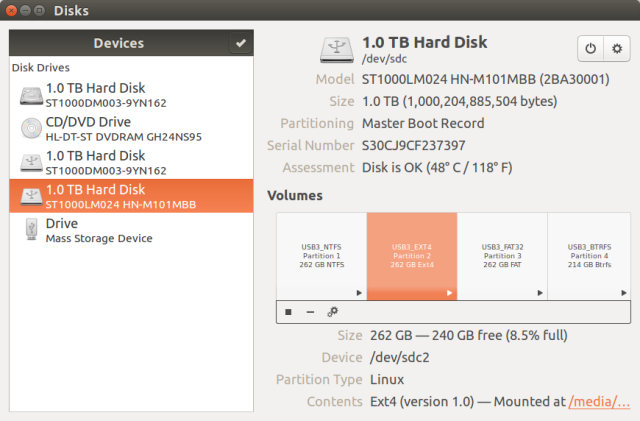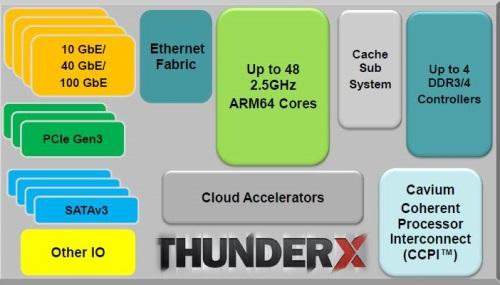As mentioned yesterday, Android L Developer Preview was about to be released, and this is now done with images for Nexus 5 “Hammerhead” and Nexus 7 “razor” available right now. However, if you don’t have either of these devices, or you’d rather not install a beta version on the phone you use everyday, you can still give a try in the SDK emulator. I’ve tried Android L myself in Ubuntu 14.04. Here’s what you have to do: Install Android Studio IDE in Ubuntu, and Create a new Project or open an existing project (Android Studio Version is now 0.61) Click on Tools->Android->SDK Manager in the top menu, and select the Android L (API 20, L Preview) packages as shown below, and click on “Install xx Packages” button. Accept the license as required, and click Install. This step can take countless hours… Now we’ll need to create a Virtual Device for […]
CubieTruck’s DVK570 Daughter Board and Add-ons (GPS, Zigbee, Sensors, RS485, and SPI Flash)
CubieTruck is one of the development boards made by CubieTech. It is powered by AllWinner A20 with 2GB RAM, Gb Eternet, various ports, and supports Android and multiple Linux distributions. Waveshare Electronics has just launched DVK570 daughter board for the CubieTruck which adds support for TV in and out, a buzzer, and headers to connect modules such as GPS, RS485, an SPI flash, a Zigbee module, a magnetometer, or a temperature sensor. Hardware features of DVK570 daughter board: CubieTruck Headers – 1x 30-pin header and 1x 24-pin header for connection with the CubieTruck Video – TVIN in, and TV Out interfaces (CVBS) Audio – 3.5mm Line IN interface Debugging – UART interface, micro USB port with USB to UART chip (Profilic PL2303) Expansions for add-on modules: 1x 4-pin I2C interface to connect I2C modules such as PCF8563 RTC Module, MAG3110 Board, and more 2x 6-pin UART interfaces (UART4 and 7) […]
64-bit ARM Server Motherboards by SoftIron
We’ve already seen development board such as X-Gene XC-1, and 64-bit ARM servers have been demonstrated by Dell and HP, but SoftIron, a British startup, claims to be the first to provide a production ready ARMv8 solutions for the enterprise server market (e.g. data centers), with its SoftIron 64-0400 and 64-0800 server motherboards powered by Applied Micro X-Gene quad and octa SoC. Although the company did not release complete pictures of the board, they seem to have done a better job with specifications: SoC SoftIron 64-0400 – Applied Micro X-Gene APM883204 with 4x 64-bit ARMv8 cores @ 2.4 GHz, 4x 32-bit ARMv5 cores for Network/Security offloads and Acceleration, and 1x Cortex M3 for server management SoftIron 64-0800 – Applied Micro X-Gene APM883208 with 8x 64-bit ARMv8 cores @ 2.4 GHz, 4x 32-bit ARMv5 cores for Network/Security offloads and Acceleration, and 1x Cortex M3 for server management System Memory – Up […]
There’s a New MarsBoard A20 ARM Linux Development Board In Town
MarsBoard, a development board based by AllWinner A10 was released last year, soon followed by MarsBoard A20 with a dual core Cortex A7 AllWinner A20 processor. That board is now called the “Old MarsBoard A20” and is replaced by the “New MarsBoard A20” that features a baseboard + computer-on-module design, increases the NAND flash capacity to 8 GB flash, and supports 1GB RAM by default, with an option for 2 GB RAM. Let’s check the specifications of this new development board: SoC – AllWinner A20 ARM Cortex A7 dual core processor @ 1GHz + Mali-400 GPU System Memory – 1GB DDR3 @ 480 MHz by default, up to 2GB DDR3 Storage – 8GB NAND Flash, SATA II interface, and micro SD slot Video I/O HDMI up to 1080p60 VGA Composite output TV-IN (composite IN) LCD connectors for RGB and LVDS interfaces, capacitive touch support Audio I/O – HDMI, Line In/Out, Microphone […]
Qiyang Technology ARM Development Boards Based on Atmel SAMA5D3, TI Sitara AM335x and Freescale i.MX6 SoCs
Hangzhou Qiyang Technology (杭州启扬智能科技有限公司) is a company based in Hangzhou, China, that provides embedded hardware solutions such as low power development boards and computer-on-modules. I’ve recently come across the company, and they have boards for various ARM based SoCs, but I’ve received details about three of their latest industrial development boards powered by Atmel SAMA5D3 Cortex A5 processor, Texas Instruments Sitara AM335x Cortex A8 SoC, and Freescale i.MX6 single and multi-core ARM Cortex A9 SoCs. Let’s have a look. Qiyang QY-A5D3XEK – Atmel SAMA5D3 Development Board The development kit is comprised of a base board (IAC-A5D3X-MB) and a computer-on-module (ICA-A5D3X_CM) with the following hardware specifications: Processor – Atmel SAMA5D3 ARM Cortex A5 @ 536 MHz (Either SAMA5D31, SAMA5D33, SAMA5D34 or SAMA5D35) System Memory – 256 MB DDR2 @ 333 MHz Storage – 256MB NAND flash + 2MB dataflash on CoM, 2x SD card slot on baseboard Video Output – VGA, […]
Texas Instruments Releases Zigbee Home Automation Gateway Reference Design Based on BeagleBone Black
Texas Instruments has recently release a complete Linux based Zigbee home automation gateway based on BeagleBone Black development and CC2531 Evaluation Module Kit hardware which you can purchase for about $100 in total, and including Z-STACK Ubuntu gateway installer, as well as Z-STACK Home, a ZigBee Home Automation (ZHA 1.2) compliant protocol stack for the company’s CC2530 and CC2538 SoCs. I won’t go into details about the BeagleBone Black as I have already covered it into details previously. However, the hardware has slightly changed since the initial release, as the 2GB eMMC has now been replaced by a 4GB eMMC, and price has been increased to about $55. CC2531 evaluation module kit is comprised of CC2531 USB Dongle which you can connect to the USB port of a PC, or in this case a BeagleBone Black, for 802.15.4 / ZigBee applications. TI also provides CC2531 USB Firmware Library on their site to let developers […]
1TB Seagate Expansion Portable Drive USB 3.0 Benchmark
Many upcoming ARM based board and device will support better connectivity with Gigagit Ethernet and USB 3.0 port, and Wi-Fi 802.11ac support. Since my media files are stored in a USB 2.0 hard drive, and my network is still using fast Ethernet and 802.11n, I had to go shopping. I’ve already purchased a 5-port Gigabit switch (D-Link DGS-1005A), and an an external USB 3.0 hard drive (Seagate Expansion 1TB Portable External Hard Drive), but I’m still looking for a decent and reasonably priced 802.11ac router (Suggestions welcomed). I’ll plan to use the USB 3.0 drive both to test file transfers over Gigabit, USB 3.0 performance, and file systems compatibility. So I’ve partitioned the drive using four common filesystems: NTFS, EXT-4, FAT32, and BTRFS, and both to make sure the drive is suitable for Gigabit transfer, and as a reference point, I’ve also performed some benchmarks. There are several tools to test […]
Cavium ThunderX Server SoC Features up to 48 ARM 64-bit Cores
ARM SBSA specification for server supports up to 268,435,456 CPU cores for the second level of standardization on one or a combination of SoCs. We’re not quite up there just yet, but Cavium ThunderX is an ARM server SoC with up to 48 cores on a single chip, which is the highest number of cores I’ve ever heard of in an ARM SoC. The company created their own custom processor cores using an ARMv8 architecture license, designing an SoC complies with ARM’s Server Base System Architecture (SBSA) standard with the following key features: ARM based SoC that scales up from 8 to 48 cores with up to 2.5 GHz core frequency with 78K I-Cache, 32K D-Cache, and 16MB L2 cache. Fully cache coherent across dual sockets using Cavium Coherent Processor Interconnect (CCPI) Integrated I/O capacity with 100s of Gigabits of I/O bandwidth 4x DDR3/4 72-bit memory controllers supporting up to 1TB RAM […]


